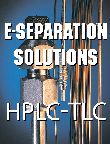SFC- The Innovative Approach
We spoke to Jeffrey Kiplinger from Averica Drug Discovery about the benefits of using SFC as a purification tool in drug discovery.
We spoke to Jeffrey Kiplinger from Averica Drug Discovery about the benefits of using SFC as a purification tool in drug discovery.
Why rely on SFC as your primary technology?
Kiplinger: The separation efficiency of SFC, all other things being equal, is3–10 times greater than HPLC. SFC uses less solvent and issimple to run. That said, it’s often more difficult to developoptimal methods for SFC and more difficult to predictperformance. SFC is still a little bit of an art compared withHPLC.
Is there an environmental benefit to using SFC?
Kiplinger: Low solvent consumption and waste is the biggest environmentalbenefit, and the CO2 used is a recycled industrial by-product. Forlarge companies these can add up to some dramatic cost savings.
What are the advantages of SFC over othertechniques?
Kiplinger: Compared with normal-phase HPLC, SFC is 5–10 times faster,consumes 2–10 times less solvent, and often makes preparativechromatography more efficient by increasingsample loading. SFC also allows a broader rangeof solvents over HPLC because most solvents aremiscible with CO2. Using all of these advantages,a typical enantiomeric separation takes us aboutone-third to one-tenth of the time of acomparable HPLC separation, and saves solventand waste disposal expenses.
What were the main obstacles youencountered when implementing SFC andhow did you overcome them?
Kiplinger: SFC technology is maturing rapidly but theinstrument companies are still settling on the bestdesigns for the systems. Historical problems likebackpressure regulation and interfaces to massspectrometers have been overcome but SFC is notyet plug-and-play like reversed-phase HPLC, for example. I'd say that the biggest obstaclefacing generalist labs is that they have to dedicate humanresources to SFC — it’s not a “walk-up” or a “walk-away”technology yet.
Is SFC capable of scaling-up to cGMP pilot or processscale and will you choose this path?
Kiplinger: There are labs, both CROs and in Pharma, that use SFC in aGMP context at the kilogram scale. In pharmaceuticaldevelopment, this approach to chiral purity is considered whena less expensive resolution or an enantioselective synthesiscan’t be developed quickly enough. The chromatographicapproach is usually less desirable because of its high cost.
At Averica we feel that chromatography is the best approachto providing the smaller quantities of pure material needed,and that we can provide that service on the extremely rapidtimescale that discovery teams need. Our projects are generallyin the 50 milligram to 50 gram range and we try to turnabsolutely every one around within two weeks. That’s ourstrength, and it’s why we’ve chosen specifically not to worktowards competing in the process scale, GMP market.
Where can researchers find out more about thepractical application of SFC?
Kiplinger: We’ve made some innovations in prep-SFC technology that wewill be presenting at the International SFC conference in Zurich, Switzerland from 1–2 October this year but ourcompetitors and customers are looking just as hard atincreasing the value of the technology. This has been a greatmeeting for both specialists and those trying to survey thefield. This is a fast-developing field that vendors, contractorsand their customers all have an active interest in improving.
Jeffrey P. Kiplingerreceived his PhD in 1984 from IndianaUniversity. His experience in the pharmaceutical industry beganwith Pfizer, where he supported discovery chemistry with liquidchromatography and mass spectrometry. At Pfizer, hedeveloped the first automated HPLC–MS purification systemsupporting library chemistry efforts. The system was latermarketed by Waters Corp. as the FractionLynx purificationsystem.
Dr. Kiplinger has founded four companies, includingPragmatic Approach, a consultancy specializing in developingenabling analytical approaches for new and expandingcompanies. Averica Discovery Services Inc. was formed in 2007as a contract research firm specializing in challengingseparations using SFC. Dr Kiplinger is the sole founder andPresident of Averica.

Investigating 3D-Printable Stationary Phases in Liquid Chromatography
May 7th 20253D printing technology has potential in chromatography, but a major challenge is developing materials with both high porosity and robust mechanical properties. Recently, scientists compared the separation performances of eight different 3D printable stationary phases.
Detecting Hyper-Fast Chromatographic Peaks Using Ion Mobility Spectrometry
May 6th 2025Ion mobility spectrometers can detect trace compounds quickly, though they can face various issues with detecting certain peaks. University of Hannover scientists created a new system for resolving hyper-fast gas chromatography (GC) peaks.
University of Oklahoma and UC Davis Researchers Probe Lipidomic Profiles with RP-LC–HRMS/MS
May 6th 2025A joint study between the University of Oklahoma Health Sciences Center (Oklahoma City, Oklahoma) and the UC Davis West Coast Metabolomics Center (Davis, California) identified differentially regulated lipids in type 2 diabetes (T2D) and obesity through the application of reversed-phase liquid chromatography-accurate mass tandem mass spectrometry (RP-LC-accurate MS/MS).

.png&w=3840&q=75)

.png&w=3840&q=75)



.png&w=3840&q=75)



.png&w=3840&q=75)




